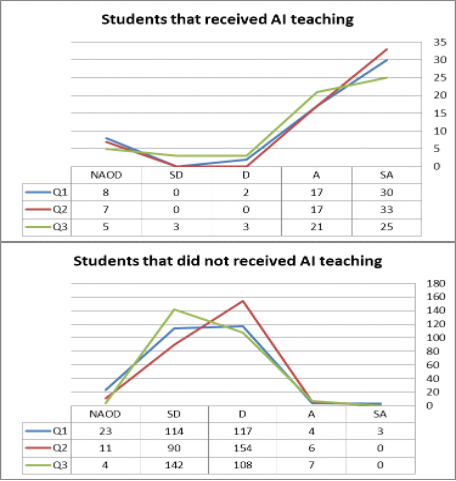Artificial Intellegence In The Future Of Iraqi Healthcare System
Kecerdasan Buatan Di Masa Depan untuk Sistem Layanan Kesehatan Irak
DOI:
https://doi.org/10.21070/joincs.v7i1.1635Keywords:
artificial intelligent, Iraqi Healthcare System, healthcare in the future, anonymous electronic surveyAbstract
The expansion of healthcare AI in Iraq highlights the growing necessity for AI education among medical students. The aim of this research is to explore the perspectives of medical students in Iraq regarding artificial intelligence (AI), including their understanding of AI and their career aspirations. Methodologically, a group of Iraqi medical students were invited to participate in an anonymous electronic survey.
The results indicate that a total of 318 responses were collected from 22 medical colleges. The majority of respondents (91.5%, s = 291) hold the belief that AI will have a significant impact on healthcare in the future. Specifically, their responses were categorized as strongly agreeing (33.6%, s = 107) or agreeing (57.9%, s = 184).
This research reveals that Iraqi medical students recognize the significance of AI and are enthusiastic about engaging with this technology. Moreover, it suggests that there is a need to expand and enhance medical college training on AI to ensure that future healthcare professionals are well-prepared in this domain.
References
M. Elahi, S. O. Afolaranmi, J. L. Martinez Lastra, and J. A. Perez Garcia, "A comprehensive literature review of the applications of AI techniques through the lifecycle of industrial equipment," Discover Artificial Intelligence, vol. 3, no. 1, p. 43, 2023.
A. C33-78, "Standard Specification for Concrete Aggregates 1," ed: ASTM International West Conshohocken, 2010.
A. M. Turing, Computing machinery and intelligence. Springer, 2009.
S. Banno, H. Murad, and M. Sallal, "Automated Cognitive Analyses for Intelligent Tutoring Systems," in 2020 IEEE/ACM International Conference on Big Data Computing, Applications and Technologies (BDCAT), 2020: IEEE, pp. 171-178.
P. Malik, M. Pathania, and V. K. Rathaur, "Overview of artificial intelligence in medicine," Journal of family medicine and primary care, vol. 8, no. 7, pp. 2328-2331, 2019.
P. Hamet and J. Tremblay, "Artificial intelligence in medicine," Metabolism, vol. 69, pp. S36-S40, 2017.
O. Asan, A. E. Bayrak, and A. Choudhury, "Artificial intelligence and human trust in healthcare: focus on clinicians," Journal of medical Internet research, vol. 22, no. 6, p. e15154, 2020.
C. Ibm, "IBM SPSS statistics for Windows," Armonk (NY): IBM Corp, 2012.
L. Clark, "Google’s artificial brain learns to find cat videos," Wired UK, www. wired. com, 2012.
J. Markoff, "How many computers to identify a cat? 16,000," New York Times, vol. 26, 2012.
M. K. Leung, A. Delong, B. Alipanahi, and B. J. Frey, "Machine learning in genomic medicine: a review of computational problems and data sets," Proceedings of the IEEE, vol. 104, no. 1, pp. 176-197, 2015.
A. M. Association, "AMA passes first policy recommendations on augmented intelligence. 2018," Accessed at www. ama-assn. org/ama-passes-first-policy-recommendations-augmented-intelligence on, vol. 6, 2018.
K. Paranjape, M. Schinkel, R. N. Panday, J. Car, and P. Nanayakkara, "Introducing artificial intelligence training in medical education," JMIR medical education, vol. 5, no. 2, p. e16048, 2019.
D. Pinto dos Santos et al., "Medical students' attitude towards artificial intelligence: a multicentre survey," European radiology, vol. 29, pp. 1640-1646, 2019.
S. Artificial Intelligence, "AI in the UK: ready, willing and able," UK House of Lords, 2018.
M. P. Recht et al., "Integrating artificial intelligence into the clinical practice of radiology: challenges and recommendations," European radiology, vol. 30, pp. 3576-3584, 2020.
L. Chen, P. Chen, and Z. Lin, "Artificial intelligence in education: A review," Ieee Access, vol. 8, pp. 75264-75278, 2020.
J. Bajwa, U. Munir, A. Nori, and B. Williams, "Artificial intelligence in healthcare: transforming the practice of medicine," Future healthcare journal, vol. 8, no. 2, p. e188, 2021.
A. Harry, "The future of medicine: harnessing the power of AI for revolutionizing healthcare," International Journal of Multidisciplinary Sciences and Arts, vol. 2, no. 1, pp. 36-47, 2023.






